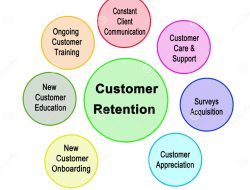Marketing Advisory Services That Help Businesses Select the Right Accounting Method sets the stage for this enthralling narrative, offering readers a glimpse into a world where businesses thrive by making informed decisions. In today’s competitive landscape, choosing the right accounting method is crucial for financial clarity and operational success. With the expert guidance of marketing advisory services, businesses can navigate the complexities of accounting options, ensuring they align with their unique goals and industry standards.
From understanding the role of marketing advisors to exploring the various accounting methods available, this discussion will illuminate the path for businesses seeking to optimize their financial strategies. By leveraging expert insights and tailored advice, companies can avoid the pitfalls of misalignment and drive towards sustained growth.
Understanding Marketing Advisory Services
Marketing advisory services play a crucial role in guiding businesses through the complexities of market dynamics and consumer behavior. They equip organizations with the insights and strategies necessary to make informed decisions, ultimately leading to sustainable growth and competitive advantage. By leveraging expert knowledge, these services empower businesses to navigate challenges and capitalize on opportunities within their respective markets.The key components of effective marketing advisory services encompass a range of strategic and analytical approaches.
These include market research, brand development, consumer insights, and strategic planning. Each component is designed to help businesses align their marketing efforts with their overall objectives, ensuring that resources are utilized efficiently.
Role of Marketing Advisory Services in Business Decision-Making
Marketing advisory services provide invaluable insights that inform business strategies and operational decisions. They facilitate a data-driven approach that enhances decision-making processes by providing analytical frameworks and market intelligence. This allows businesses to understand market trends, customer preferences, and competitive landscapes. Some essential elements include:
- Market Analysis: Comprehensive evaluation of market conditions, trends, and potential growth areas.
- Consumer Behavior Insights: Understanding customer needs, motivations, and purchasing patterns.
- Brand Positioning Strategies: Crafting a unique value proposition that differentiates the business in the marketplace.
- Performance Metrics: Establishing key performance indicators (KPIs) to measure the effectiveness of marketing strategies.
Key Components of Effective Marketing Advisory Services
The effectiveness of marketing advisory services is underpinned by several core components that ensure comprehensive support for businesses. These elements involve a systematic approach to integrating marketing strategies with overall business goals.Key components include:
- Strategic Planning: Developing a roadmap for achieving marketing objectives while aligning with business goals.
- Digital Marketing Expertise: Leveraging online platforms and tools to reach target audiences effectively.
- Brand Development: Creating a strong brand identity and ensuring consistent messaging across all channels.
- Competitor Analysis: Identifying and evaluating competitors to inform strategic positioning and marketing tactics.
Examples of Successful Marketing Advisory Services in Different Industries
Various industries have successfully utilized marketing advisory services to enhance their market presence and drive growth. Recognizable examples illustrate the diverse applications of these services across sectors.In the retail sector, a renowned fashion brand engaged a marketing advisory firm to revamp its brand strategy. Through extensive market research and consumer analysis, they repositioned themselves, resulting in a 30% increase in sales within a year.In the technology industry, a startup collaborated with a marketing advisory service to penetrate a competitive landscape.
By adopting targeted digital marketing strategies, they achieved a 50% growth in their user base within six months.Lastly, in the hospitality sector, a hotel chain utilized marketing advisory services to improve customer engagement. By implementing personalized marketing campaigns based on consumer data, they realized a significant boost in customer loyalty and repeat bookings.These examples demonstrate how tailored marketing advisory services can lead to tangible results and long-term success across various industries.
Importance of Selecting the Right Accounting Method
The choice of accounting method is a fundamental decision for any business, directly influencing financial reporting, tax obligations, and overall business strategy. Selecting the right accounting method can lead to improved financial insights, enhanced decision-making, and stronger compliance with accounting standards.The significance of this decision is underscored by the potential consequences of choosing the wrong accounting method. A misplaced choice can result in misleading financial statements, inappropriate tax liabilities, and even legal implications.
Moreover, it can hinder a business’s ability to attract investors and secure financing, as stakeholders rely on accurate financial reporting for informed decision-making.
Consequences of Selecting the Wrong Accounting Method
The repercussions of not aligning the accounting method with business needs can be severe and far-reaching. When businesses choose an inappropriate accounting method, they may face the following outcomes:
- Inaccurate Financial Reporting: Misleading financial statements can result from an unsuitable accounting method, jeopardizing decision-making processes.
- Increased Tax Liabilities: Certain methods may lead to higher tax burdens, affecting cash flow and profitability.
- Difficulty in Securing Financing: Investors and lenders may be hesitant to engage with businesses that present unreliable financial data.
- Compliance Issues: Non-compliance with accounting standards can lead to penalties and a tarnished reputation.
- Operational Inefficiencies: An incompatible accounting method may complicate financial management and hinder strategic planning.
Overview of Various Accounting Methods
Businesses have a variety of accounting methods to choose from, each with distinct advantages and suitability depending on the nature of the business and its financial reporting needs. Understanding these methods is crucial for making an informed choice:
- Cash Basis Accounting: Recognizes revenue and expenses when cash is actually received or paid. This method is straightforward and beneficial for small businesses with simple transactions.
- Accrual Basis Accounting: Records revenues and expenses when they are incurred, regardless of cash flow. This method provides a more accurate financial picture and is often required for larger businesses.
- Modified Cash Basis Accounting: A hybrid approach that combines elements of cash and accrual methods, suitable for businesses that need flexibility.
- Tax Basis Accounting: Focuses on tax reporting purposes, allowing businesses to follow tax rules rather than GAAP. This can be advantageous for small businesses wanting to simplify their accounting.
- Fair Value Accounting: Requires businesses to measure and report assets and liabilities at their current value, providing a dynamic view of the company’s financial health.
“Choosing the appropriate accounting method is not just a matter of compliance; it shapes the very foundation of a business’s financial strategy.”
Marketing Advisory Services and Accounting Methods
Marketing advisory services play a crucial role in guiding businesses through the complex landscape of accounting methods. By offering tailored advice and strategic insights, these services empower companies to make informed decisions that align with their operational goals and financial objectives. Understanding which accounting method to adopt is not just a compliance issue; it’s a strategic choice that can impact a business’s financial health and marketing strategy.The integration of marketing strategies with accounting choices is essential for ensuring consistency and effectiveness in business operations.
Marketing advisory services can facilitate this alignment by providing insights into how different accounting methods can influence financial reporting, tax obligations, and cash flow management. This alignment is particularly important when considering the implications of accounting methods such as cash basis vs. accrual basis, or the choice between different inventory accounting methods like FIFO (First In, First Out) and LIFO (Last In, First Out).
Evaluation of Accounting Methods
Understanding the evaluation of accounting methods is vital for effective business strategy. Marketing advisory services offer a structured approach to evaluating these methods by considering the unique needs and goals of the business. The evaluation process typically involves the following steps:
- Assessment of Business Objectives: Marketing advisors begin by analyzing the business’s short-term and long-term objectives, ensuring that the selected accounting method supports these goals.
- Analysis of Financial Implications: Each accounting method has distinct financial impacts, which can affect profitability and tax liabilities. Advisors illustrate how these implications align with marketing budgets and revenue forecasts.
- Review of Regulatory Compliance: Ensuring compliance with financial regulations and standards is crucial. Advisors keep businesses informed about relevant accounting regulations that may affect their choice of method.
- Recommendation of Optimal Method: Based on the assessment, marketing advisors recommend the accounting method that best aligns with the business’s operational structure and market strategy.
Case Studies Impacting Accounting Method Selection
Several case studies illustrate the significant impact of marketing advisory services on accounting method selection. These real-life examples highlight how strategic guidance can reshape a business’s financial landscape:
- A retail company faced challenges in inventory management and cash flow due to an inappropriate accounting method. Upon engaging with a marketing advisory service, the company transitioned from LIFO to FIFO accounting, which not only improved its cash flow visibility but also enhanced its marketing capabilities by allowing for more accurate pricing strategies during peak seasons.
- A tech startup opted for cash basis accounting initially. However, as it scaled, the marketing advisory team identified that switching to accrual accounting would provide a clearer picture of revenue recognition. This shift allowed the startup to better align its marketing efforts with actual performance metrics, resulting in more targeted customer engagement.
“Choosing the right accounting method is not just about compliance; it’s about creating a foundation for marketing success.”
These case studies underscore the importance of leveraging marketing advisory services to make informed decisions regarding accounting methods, ensuring that businesses not only comply with regulations but also thrive in competitive markets.
Factors Influencing the Choice of Accounting Method

Selecting the right accounting method is vital for any business, as it shapes financial reporting, tax obligations, and overall business strategy. Various factors influence this decision, and understanding them is essential for aligning accounting practices with business goals.Several key elements directly impact the choice of accounting methods. It is crucial for businesses to assess the following factors to determine the most suitable approach for their operations:
Key Factors in Accounting Method Selection
The selection of an accounting method is influenced by various internal and external factors. Evaluating these can aid in making an informed decision that aligns with both regulatory requirements and organizational goals.
- Industry Standards: Different industries have established accounting practices that may dictate the method chosen. For instance, businesses in the manufacturing sector often adopt the accrual method to accurately reflect inventory and production costs, whereas service-oriented businesses may benefit from the cash basis method.
- Company Size: Smaller businesses might prefer simpler methods like cash accounting for ease of management, while larger corporations often adopt accrual accounting to meet investor and regulatory expectations.
- Financial Goals: The company’s financial objectives, such as seeking investment or managing cash flow, can influence the choice of accounting methods. For example, businesses looking to attract investors may opt for accrual accounting to present a more comprehensive view of financial performance.
- Tax Considerations: Different accounting methods can result in varying tax obligations. Businesses should evaluate how each method impacts taxable income and overall tax liability.
Influence of Industry Standards on Accounting Method Choices
Industry standards play a significant role in determining the accounting method a business should adopt. Adhering to these standards ensures compliance with regulatory expectations and enhances credibility among stakeholders.Various industries have specific guidelines that dictate accounting practices. For example, the healthcare sector often requires accrual accounting to manage complex billing and revenue recognition processes. By aligning with industry norms, businesses can:
- Maintain compliance with regulatory bodies.
- Facilitate financial analysis and benchmarking against competitors.
- Enhance the transparency and accuracy of financial reporting.
Impact of Company Size and Financial Goals
The size of a business and its financial aspirations significantly affect accounting method selection. As businesses grow, their accounting needs become more complex, necessitating a shift in methods.Larger companies often employ more sophisticated accounting practices to manage multiple revenue streams and adhere to regulatory requirements. Conversely, smaller companies may prioritize simplicity and cost-effectiveness, often leaning towards cash accounting. The following points highlight the impact of size and goals:
- Resource Availability: Larger companies typically have the resources to implement and maintain complex accounting systems, while smaller firms may opt for less resource-intensive methods.
- Growth Objectives: Companies focused on scaling up may choose methods that provide a clearer picture of financial health and facilitate better planning.
- Investment Needs: Businesses seeking external funding often adopt methods that offer transparency and reliability, such as accrual accounting.
Understanding these factors equips businesses with the necessary insights to select an accounting method that complements their operations and strategic goals.
Strategies for Effective Collaboration with Advisors
Effective collaboration with marketing advisors is essential for businesses aiming to select the right accounting method tailored to their unique needs. A structured approach to collaboration can enhance communication, ensuring that both parties understand the business goals and accounting requirements. By integrating strategic collaboration practices, businesses can foster a productive relationship with their advisors, leading to informed decision-making and improved financial outcomes.
Framework for Collaboration
Establishing a solid framework for collaboration between businesses and marketing advisors is crucial. This framework should include clear roles, responsibilities, and expectations, which can be articulated through the following components:
- Define Clear Objectives: Businesses should align their accounting needs with specific marketing goals, ensuring that both parties share a common vision.
- Regular Meetings: Schedule consistent check-ins to discuss progress, address concerns, and reassess objectives as necessary.
- Feedback Mechanisms: Implement processes for providing constructive feedback, allowing advisors to adapt their strategies effectively.
Communication Strategies
Effective communication is the backbone of collaboration. Strategies that facilitate better understanding of accounting needs should include:
- Utilize Active Listening: Both parties should practice active listening, encouraging open dialogue to clarify any misconceptions.
- Use Visual Aids: Illustrate complex accounting concepts with charts or graphs, making it easier for advisors to grasp the business’s needs.
- Establish a Common Language: Agree on terminology to avoid confusion, ensuring that both advisors and business stakeholders are on the same page.
Aligning Business Objectives with Advisory Recommendations, Marketing Advisory Services That Help Businesses Select the Right Accounting Method
To maximize the effectiveness of advisory services, businesses must ensure their objectives align with the recommendations provided by advisors. Techniques for achieving this alignment include:
- Develop a Shared Vision: Collaboratively create a mission statement that encapsulates both the business’s goals and the advisory strategies.
- Involve Advisors Early: Engage marketing advisors at the onset of decision-making processes, allowing them to understand context and propose informed solutions.
- Set Measurable Outcomes: Define key performance indicators (KPIs) that reflect both business and advisory objectives, fostering accountability and tracking progress.
“Successful collaboration transforms advisory input into actionable strategies, driving better financial decision-making.”
Measuring the Success of Selected Accounting Methods
Selecting the appropriate accounting method is just the first step; measuring its success is crucial to ensure it delivers the desired financial clarity and operational efficiency. Businesses need to track specific metrics and key performance indicators (KPIs) that provide insights into the effectiveness of their accounting choices.Understanding how to gauge success requires businesses to focus on relevant performance indicators that reflect their financial health and operational effectiveness.
The right metrics will help identify areas for improvement, ensuring that the selected accounting method aligns with the overall business strategy.
Key Performance Indicators for Accounting Methods
To effectively measure the success of the chosen accounting method, businesses should consider a range of performance indicators. These indicators serve as benchmarks to evaluate financial performance and operational efficiency. The following are essential metrics to track:
- Net Profit Margin: This metric measures how much profit a company makes for every dollar of revenue, providing insight into the overall profitability with the current accounting method.
- Current Ratio: This liquidity ratio indicates a company’s ability to pay off its short-term liabilities with its short-term assets, helping assess financial stability.
- Days Sales Outstanding (DSO): This measures the average number of days it takes to collect payment after a sale, reflecting the efficiency of accounts receivable under the accounting method used.
- Return on Assets (ROA): This ratio shows how efficiently a business is utilizing its assets to produce profit, an important indicator of overall performance.
- Cash Flow Statement Analysis: Examining inflows and outflows can provide insights into liquidity and operational efficiency, crucial for assessing the impact of the selected accounting method.
“Measuring success through these indicators allows businesses to adapt their accounting methods to enhance profitability and operational efficiency.”
Marketing advisory services play a vital role in measuring success post-implementation by offering expertise in analytics and insights. They can assist businesses in setting up appropriate tracking mechanisms and interpreting the data collected from these KPIs. Through regular assessments and tailored reports, marketing advisors can provide guidance on necessary adjustments to accounting methods, ensuring ongoing alignment with business goals and market dynamics.
This collaborative approach enhances the effectiveness of the chosen accounting strategy, promoting sustained growth and operational excellence.
Future Trends in Marketing Advisory and Accounting: Marketing Advisory Services That Help Businesses Select The Right Accounting Method
The landscape of marketing advisory services and accounting methods is rapidly evolving, driven by technological advancements and changing business needs. As companies strive for efficiency, transparency, and compliance, understanding the future trends in this domain becomes essential for sustaining competitive advantages. This section explores the emerging trends that are set to redefine marketing advisory services and their influence on accounting methods.
Emerging Trends in Marketing Advisory Services Affecting Accounting Methods
Several trends are reshaping the marketing advisory landscape, necessitating a reevaluation of how businesses approach accounting methods. Key trends include the increasing use of data analytics, the rise of personalized marketing strategies, and an enhanced focus on sustainability. These shifts require businesses to adapt their accounting practices to accommodate new metrics and reporting standards.
- Data-Driven Decision Making: The demand for real-time analytics is driving businesses to implement accounting methods that can harness this data effectively. Companies are moving towards methods that allow for more dynamic financial reporting, enabling them to make informed decisions quickly.
- Sustainability Reporting: As consumers increasingly prefer brands with sustainable practices, accounting methods are evolving to include sustainability metrics. This need is pushing businesses to adopt frameworks that align financial health with environmental impact, thereby enhancing their marketability.
- Personalized Marketing Metrics: With the rise of tailored marketing strategies, businesses are seeking accounting methods that can accurately reflect the costs and returns of personalized campaigns, necessitating more granular financial tracking.
Impact of Technology on the Future of Advisory Services in Accounting
Technology is revolutionizing how marketing advisory services operate, particularly in the realm of accounting. Innovations such as artificial intelligence (AI), machine learning, and blockchain are transforming traditional practices, thereby enhancing efficiency and accuracy.
- Artificial Intelligence: AI tools are automating routine accounting tasks, reducing human error, and providing deeper insights through predictive analytics. This allows marketing advisors to focus on strategic decision-making rather than manual data entry.
- Blockchain Technology: The introduction of blockchain is enhancing transparency and trust in financial transactions, making it easier for businesses to maintain accurate records and comply with regulations.
- Cloud-Based Solutions: Cloud technology is facilitating real-time access to financial data, empowering marketing advisors to provide timely insights and recommendations based on current market conditions.
Preparation for Changes in the Advisory Landscape
To remain competitive in a rapidly changing advisory landscape, businesses must proactively adapt to emerging trends. Effective preparation strategies include investing in advanced technologies, fostering a culture of data literacy, and collaborating closely with advisory partners to stay informed on best practices.
- Investment in Technology: Companies should prioritize the integration of advanced accounting software and analytics tools that support evolving marketing strategies.
- Building Data Literacy: Training employees in data interpretation and analysis is crucial for leveraging the insights provided by modern advisory services.
- Collaborative Partnerships: Establishing strong relationships with marketing advisors enables businesses to remain agile and responsive to changes in the advisory environment.
“In an age where data drives decisions, adapting accounting methods to incorporate new insights is no longer optional; it’s essential for success.”















